Almost from the moment I left Tainan’s Guanmiao District (關廟) and entered Longci District (龍崎), I could hear the distinctive two-note screech of a crested serpent eagle.
These reptile-hunters are often heard and just as often seen in Taiwan’s foothills. Pedaling southeast on City Highway 182, I glimpsed one circling in the distance — then I kept my head down and devoted myself to maintaining a reasonable speed on an uphill section. I’m not the kind of cyclist who relishes tough climbs, but I’ve always enjoyed Road 182. None of its gradients are brutal, and the scenery is a mix of lush bamboo forest and moonscape-like ridges.
The western end of Road 182 lies in the old heart of Tainan. At its eastern end, this 34.9km-long route merges with Provincial Highway 3 in Kaohsiung’s Neimen District (內門), near Purple Bamboo Temple (紫竹寺).
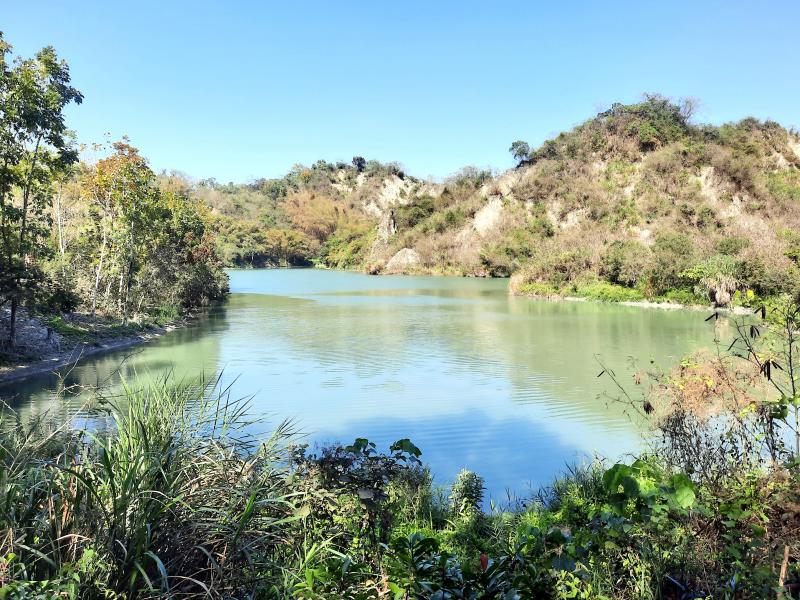
Photo: Steven Crook
Except on weekends — when motorcycle enthusiasts roar between the hamlets of Wujian (五間) and Jiadonglun (茄苳崙), while their girlfriends snap photos of them leaning into corners — Road 182 is seldom busy. That said, there’ll be more traffic than usual between March 25 and April 5 this year, when people will be heading to Neimen for the Song Jiang Battle Ritual (內門宋江陣).
SONG JIANG BATTLE RITUAL
The Battle Ritual is a cultural celebration that grew up out of chronic insecurity. Back in the 18th and 19th centuries, when banditry was rife and violence occasionally erupted along clan or ethnic lines, dozens of temples maintained community defense units called Song Jiang battle teams (宋江陣). The name honors Song Jiang (宋江), a rebel in 12th-century China who was later immortalized as the central character in The Water Margin, a classic novel written sometime between 1340 and 1524.
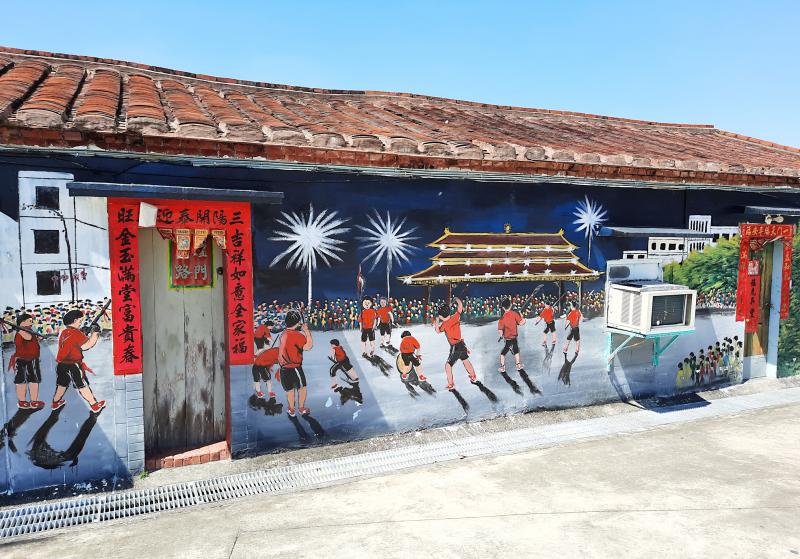
Photo: Steven Crook
Nowadays, the Song Jiang Battle Ritual is a competition in which teams hoping to win cash prizes show off their physical dexterity and coordination. Visitors can expect to see ritualized dueling with pitchforks, shields, staves and swords, as well as unarmed martial arts. Farm tools sometimes make an appearance, as in the past militiamen had to be able to fight using whatever was at hand.
This year, the event incorporates Neimen’s other claim to fame: The district has produced an exceptional number of bando (辦桌, traditional roadside banquet) chefs, some of whom will be cooking for visitors. To book a table, and find other information about the Battle Ritual, see www.who-ha.com.tw (Chinese only).
CONSERVATION PARK
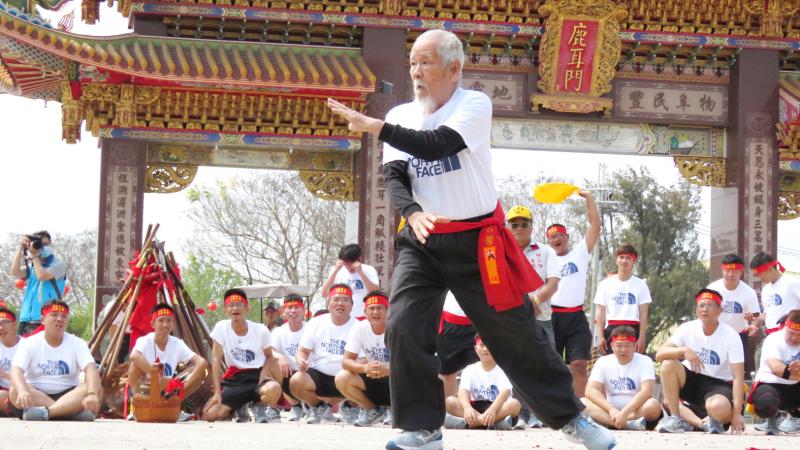
Photo: Tsai Wen-chu, Taipei Times
I’d set my sights on a scenic spot managed by a government agency that plays a crucial if little-appreciated role in Taiwan’s countryside. The name of the Council of Agriculture’s Soil and Water Conservation Bureau (水土保) tells you what it does, and at Neopu Mudstone Area Soil and Water Conservation Park (牛埔泥岩水土保持教學園區) visitors can see some of its techniques demonstrated.
To reach Neopu, I turned south off Road 182 inland of the km25 marker. Tainan Local Road 167 (南167) provides access to the village of Nioupu (牛埔) — a dozen households, maybe, and a noodle-making operation — the conservation park, and what’s marked on maps as the Veterans Affairs Council Longci Factory (退輔會龍崎工廠).
The factory reprocessed old munitions into mining explosives from the late 1970s until 2007. A plan to convert the 331-hectare site into a specialized landfill for industrial waste was dropped due to opposition from local residents, and early last year 149 hectares were set aside as a nature reserve.
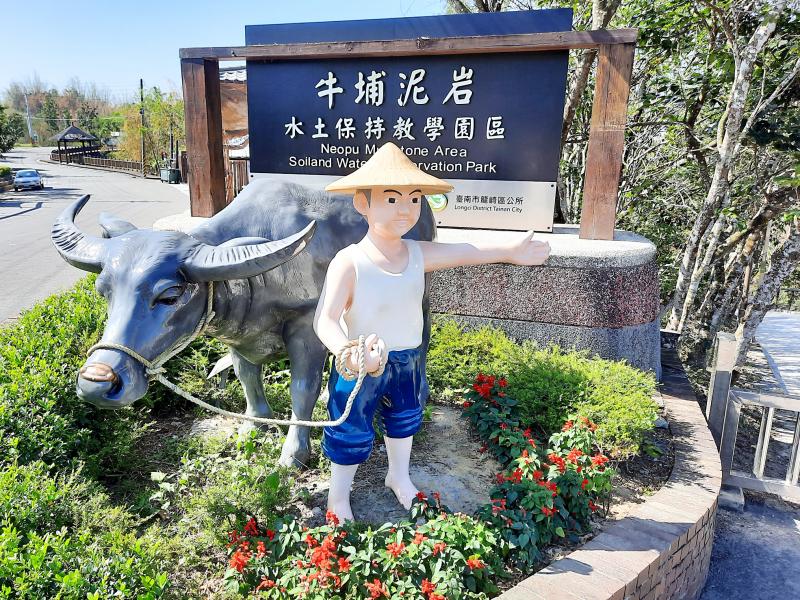
Photo: Steven Crook
Currently, there doesn’t seem to be any easy way for outsiders to take a look at the nature reserve. Visiting the conservation park, by contrast, is a cinch. There’s no need to book ahead, or even pay an admission charge. The entrance is open from 9am to 5:30pm daily. As you approach from the north, look for the comic-book farmer with his water buffalo on the right, and you’ll see the gate.
The park’s most photogenic feature is Dream Lake (夢幻湖). Ninety minutes is more than enough time to explore the walking paths around it, but if you find gradients or steps difficult, you may prefer to stay up by the road.
Many of the trees and plants here have been labeled with their English, Chinese and scientific names. Among them are fountain tree, garden croton and Honduras mahogany, as well as various grasses.
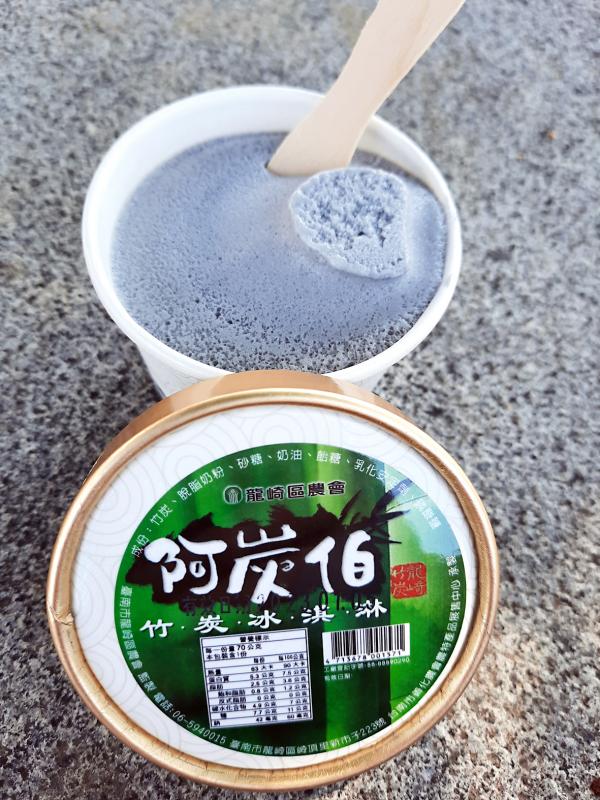
Photo: Steven Crook
WENHANG TEMPLE
On the return leg via Road 182, I refilled my water bottle at Wenhang Temple (文衡殿), just east of the km21.5 marker.
It’s the largest place of worship between Guanmiao and Neimen, and the most interesting thing about it is its origin myth. According to the temple’s Web site, when founder Chen Ching-fei (陳慶飛) was a young man, he suffered from such severe problems with his feet that he was often incapable of walking.
While he prayed late one night in 1967, the Chinese deity of war and martial arts Guan Gong (關公) appeared before him in a blaze of sunshine, despite dawn being hours away.
Later, Guan Gong instructed Chen to enter the construction industry. He enjoyed rapid and considerable success, and in 1987 he established Wenheng Temple to express his gratitude. The Web site doesn’t say if he ever found a permanent cure for his feet.
BAMBOO CHARCOAL CULTURE CAMPUS
The only part of Longci that might be described as “urban” is just west of the gas station, near the km19 marker. There are some quaint buildings, among them one that’s now the Bamboo Charcoal Culture Campus (竹炭故事館, open 8am to 4:30pm on weekdays; until 5pm on weekends).
The shop there certainly makes the most of one of Longci’s signature products. I ignored the bamboo-charcoal soap, bamboo-charcoal laundry detergent, bamboo-charcoal socks and bamboo-charcoal undergarments. (Bamboo charcoal has excellent odor-absorbing properties.) But when I spotted a freezer full of bamboo-charcoal ice cream, I knew I had to try some.
It wasn’t bad. But, to be honest, I’d have preferred ice cream made with some of the pineapples for which Longci is renowned.
Instead of returning home via Road 182, I took a more rural route to Guanmiao. Tainan Local Road 162 (南162) brought through Nanliao (南寮) and Beiliao (北寮), neighboring villages enlivened by dozens of colorful murals.
At Dog Bite Creek (咬狗溪), I saw neither humans nor canines — and I relished silence broken only by birdsong one last time before reentering the crowded lowlands.
Steven Crook has been writing about travel, culture and business in Taiwan since 1996. He is the author of Taiwan: The Bradt Travel Guide and co-author of A Culinary History of Taipei: Beyond Pork and Ponlai.

This month Taiwan received a brutal Christmas present as the Chinese Nationalist Party (KMT) passed all three of its desired amendments, making recalls of elected officials more difficult, gutting the Constitutional Court and altering the budgetary allocations to local governments. The nation at present has no ultimate authority to determine the constitutionality of government actions, and the local governments, largely controlled by the KMT, have much greater funding. We are staring into an abyss of chaos. The amendments to the Act Governing the Allocation of Government Revenues and Expenditures (財政收支劃分法), if they become law (as of this writing President William Lai

Dec. 30 to Jan. 5 Premiering on Jan. 4, 1956, Xue Pinggui and Wang Baochuan (薛平貴與王寶釧) unexpectedly packed theaters for the next 27 days. Taiwan’s first 35mm Hoklo-language (commonly known as Taiwanese) movie beat out the top Hollywood blockbuster, Land of the Pharaohs, and the Mandarin-language Peach Blossom River (桃花江) in box office sales, kicking off a craze that lasted until around 1970. More than 800 Hoklo-language films were made despite government attempts to promote Mandarin. The Chinese Nationalist Party (KMT) owned the nation’s three major production houses, mostly creating Mandarin films filled with anti-communist messages and patriotic propaganda. But most

Charges have formally been brought in Taiwan People’s Party (TPP) Chairman Ko Wen-je’s (柯文哲) bribery, corruption and embezzling of campaign funds cases. Ko was briefly released on bail by the Taipei District Court on Friday, but the High Court on Sunday reversed the decision. Then, the Taipei District Court on the same day granted him bail again. The ball is in dueling courts. While preparing for a “year ahead” column and reviewing a Formosa poll from last month, it’s clear that the TPP’s demographics are shifting, and there are some indications of where support for the party is heading. YOUNG, MALE

Something strange happened in former president Tsai Ing-wen’s (蔡英文) second term: She remained popular. According to My-Formosa.com polling at the time, she scored high on trustworthiness and satisfaction with her governance spiked at the beginning of her second term, then in the remaining three years stabilized into a range of the upper forties to mid-fifties. This is especially remarkable since her second term was marred by several scandals, which resulted in an electoral drubbing for the Democratic Progressive Party (DPP) in the 2022 local elections — the worst result since the party’s founding. Most politicians around the world would salivate